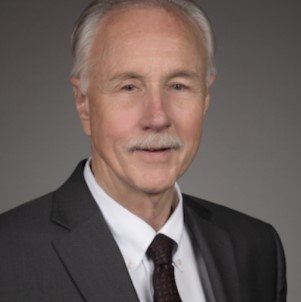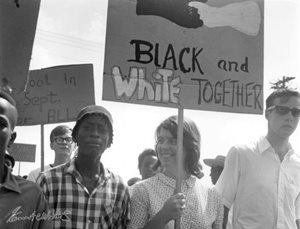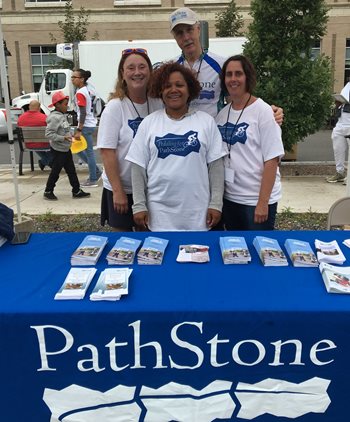When you ask someone in affordable housing and community development to talk about Stuart J. Mitchell III, CEO emeritus of PathStone Corp. and recipient of the 2024 NeighborWorks Founders Award, the answer is usually "Where do I start?" Mitchell's career spans more than 50 years, and his impact is long and deep. So perhaps it makes sense to go back to the summer of 1965, when Mitchell's world  view shifted, paving the way for a life in community development.
view shifted, paving the way for a life in community development.
That summer, between Mitchell's junior and senior year at Cornell University, he was wrestling with a career choice between the family dairy farm and his father's insurance business. He'd been leaning toward the farm when his housemate convinced him to go south to help sharecroppers register to vote as part of the West Tennessee Voters Project.
"It was absolutely transformative," Mitchell says of the days he spent renting a room in a sharecropper's home in Fayette County, one of the poorest counties in the country. It was "a world away" from what he'd known at Cornell. It was a world he was determined to learn more about.
He went on to Covington, Tennessee, working with the Congress of Racial Equality and becoming part of a movement protesting the treatment of Black students whose potential for education was less valued than their potential to pick cotton. His job that summer – and ever since – was to work alongside local people, not telling them what to do but helping them achieve goals they set for themselves. That practice aligns with NeighborWorks America's values, which center resident voice and leadership.
"It's been a faith journey for me," Mitchell says. "That's how I understand my decision."

When Mitchell returned to Cornell, "my world had been turned upside down by what I'd observed," he shares. He talked to his minister, who suggested divinity school. He enrolled, and during the summers, he worked with farmworkers on behalf of the United Methodist Church.
In 1969, a professor he knew applied for funding on behalf of several farmworker advocacy organizations, and in 1973 they incorporated to become what is today known as PathStone. Mitchell started as an advisor, becoming an employee in 1973 and president and CEO in 1977.
A growing organization to center farmworkers
The NeighborWorks Founders Award is presented each year to a current or former leader from NeighborWorks America or the network who has an enduring legacy in the housing and community development field. In her letter nominating him for the award, Yesenia Ramos-Torres, director of Operations and Legal Services at PathStone, explains that their organization went from a budget of $3 million at the start of Mitchell's tenure to a budget that exceeded $100 million by the end of it. By the time Mitchell "retired" in 2019 and started consulting, PathStone operated 12 lines of business in seven states and Puerto Rico, where they reached out at the instigation of the farmworkers on their board of directors. The organization now operates in nine states and Puerto Rico.
Throughout all of the changes, Mitchell says, "The mission and the history are still centered around farmworkers."
Accomplishments over his career include:
- Combining resources with partners to grow PathStone's mission, allowing a bigger reach into real estate development for affordable housing.
- Affiliating with The Housing Council, Inc., one of the state's largest HUD-approved comprehensive counseling agencies.
- Managing more than 3,000 units of affordable housing through PathStone Management Corporation and providing residents with support.
- Career, mentoring and workforce training.
PathStone joined the NeighborWorks network in 1996. "We discovered this network of seriously engaged housers and that relationship has taken us to a whole new level," Mitchell recalls.
His background – in ministry, in agriculture, in civil rights – meant he was the right person in the right place at the right time, says John Wiltse, PathStone's senior operations director, Housing Division. "He forged a lot of tools for low-wealth and disenfranchised folks to improve their lives over his career." And he pointed out an urgency of creating a power structure that would support social and economic parity, and the need to work together to fix it.
At the beginning of his career, Mitchell and his staff worked on weatherization to help make homes for farmworkers safer and got into health services and job training for migrant farmworkers and their families. Job training, workforce development, child development and health services for farmworkers became core components of PathStone's human services division, Wiltse says. Over 4,500 lower income farmworkers engage in job training and supportive employment each year; based on their interests, aptitude and local job market demand, many graduates move into better-paying, more stable, safer jobs such as truck drivers, licensed practical nurses and skilled tradespeople.
 Lee Beaulac, who has worked with Mitchell since 1975, says one of the central parts of Mitchell's life "is the grounding of the spiritual." Mitchell was ordained in 1970 as a United Methodist minister. "His career in community development is really something that flows out of his deep faith in the betterment of communities. That's an important part of Stuart as a human being – and as a leader."
Lee Beaulac, who has worked with Mitchell since 1975, says one of the central parts of Mitchell's life "is the grounding of the spiritual." Mitchell was ordained in 1970 as a United Methodist minister. "His career in community development is really something that flows out of his deep faith in the betterment of communities. That's an important part of Stuart as a human being – and as a leader." Mitchell employed many people who were technical experts when it came to affordable housing – people who stayed, adds Wiltse, who has been with the organization since 1991. "He was a visionary leader, a partnership builder. He'd have lunch with somebody or be riding a stationary bike at the gym next to somebody and the next thing you know, we'd be merging with a new organization. We'd get a text at 5:30 in the morning telling us to be ready for a meeting at 8:30."
When Mitchell entered the NeighborWorks Achieving Excellence Program, he and fellow student Susan Ottenweller of Housing Opportunities, Inc., decided their capstone project in 2005 would be a merger.
A team with vision and faith in people
"He's the idea guy," Wiltse says. "We had some hard lessons, but Stuart was always firm: If it was easy, the ‘for-profits' would be doing it. His attitude was, ‘There's nothing that's going to hold us back. It might be hard. It might take time. But we're going to figure it out.'"
Mitchell "had faith in people," adds Judith K. Rose, senior relationship manager at NeighborWorks. "They worked as a team to solve unsolvable problems."
Mitchell also made sure to direct resources to rural housing projects. When the tax credit program first began, those projects favored urban and suburban housing that could be built on a larger scale. "Stuart kept emphasizing the needs of rural areas," Wiltse says. "There were others who would do suburban and urban. But if it wasn't PathStone, he said, it wouldn't be anybody."
PathStone built a network not unlike NeighborWorks' own, with affiliates in different states, identifying unmet needs and trusting staff to fulfill those needs. Meanwhile, Mitchell's board, and the boards of the PathStone affiliate organizations, have included a majority of community members, mostly the rural farmworkers they were helping. Meetings are held in both English and Spanish.
Ernest "Buster" Caswell has been one of those board members since 2017. Hailing from Vermont, where he worked on a dairy farm, he now works in an apple orchard.
"Stuart always believed that to know what the problems are and know how to solve them, you had to hear the voices of the people who we served — the voices of the farmworkers," Caswell says. "Hearing those voices and connecting those voices to opportunities, it works hand in hand. Advocacy is a huge part of our mission. I think it's the most important part. We hear voices of the people in the field and when they're part of the organization that helps bring an awareness to their struggles."
Margaret A. Sanchez, who provided diversity training for PathStone, wrote a letter as part of Mitchell's nomination, saying that her connection to the organization was personal: Her parents and grandparents had been farmworkers. "His work was not just about a 'job,' rather this commitment and work on behalf of farmworkers and any underserved group was about a lifetime, deep-rooted sense of fairness and goodness for all."
Mitchell extended his knowledge to NeighborWorks when he became an active member of the nonprofit's Race, Equity, Diversity and Inclusion (REDI) Advisory Group. "I was glad to be a part of it," he says. "There were mistakes. But there was also progress. That's what change is about.
Recognizing the need for change
For more than 50 years, change has remained one of PathStone's goals —, and Mitchell's as well. And that's part of what being a founder means, he says. "I'm proud to be called a founder of an organization committed to addressing poverty and trying to improve our community ... As an entrepreneurial social equity organization, we always look for opportunities to invest our resources in the people we are serving. The community, when working together, can impact their own lives and the lives of their
 neighbors."
neighbors." His time in Tennessee helped teach him that. He saw parents lose jobs when they boycotted schools in the hopes that their kids could get an equal chance at education. He saw people beaten. He, himself, ended up in jail for integrating a segregated restaurant. "I began to appreciate what a community could do in support of each other, especially if it was for a cause that resonated with everyone," he says.
Mitchell believes the next chapter in his career – he continues to serve as a consultant to community-based organizations – will center on telling the story of redlining, "what it did to our communities across the country, created the disparate segregation we are dealing with today.
"Our work in community development is a lifelong calling," he says. "I'm 80 years old; I'm still on that same journey."

